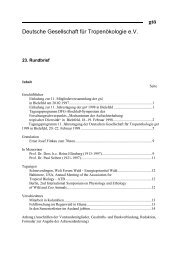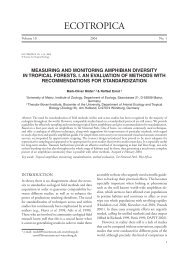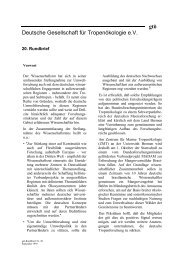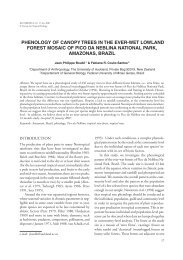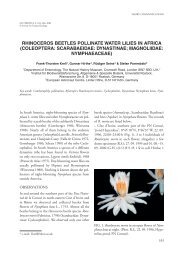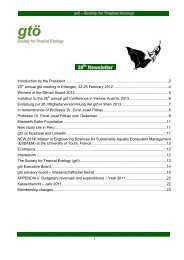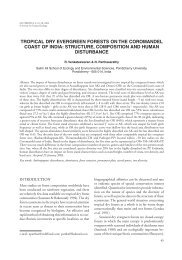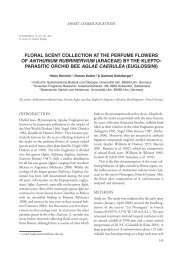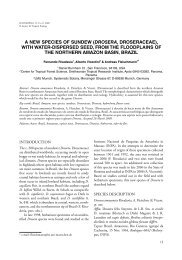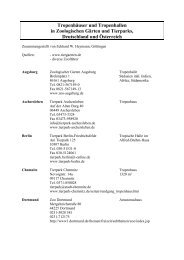120 PLENARY KEYNOTE HALL H III: THURSDAY 9:10PARALLEL SESSION HALL H III | HOTSPOT WALLACEA121Keynote speaker: Doyle McKeyChair: Karl WantzenThursday, 24 February, 9:10 | Hall H IIIAGROECOLOGY, RESILIENCE AND TROPICAL BIODIVERSITY: WHATDO PAST AND PRESENT AMAZONIAN FARMERS TELL US?Doyle McKey, CEFE, CNRS, Montpellier, FR, d_mckey@hotmail.comTHURSDAY 9:10 Hall H IIIThe need to reconcile food production, ecosystem services and biodiversityconservation has spurred the search <strong>for</strong> more sustainable ways of farming.Successful agroecological solutions are likely to be strongly case-specific,so we must cast our net broadly in the hunt <strong>for</strong> ideas. The folk knowledge ofsmallholder farmers is one source of inspiration <strong>for</strong> the diverse solutions that willbe needed. Of necessity, these farmers have developed ingenious adaptationsthat do not depend on costly external inputs, that allow long-term use of alimited land base, and that function even in marginal environments. I will firstfocus on one such case, Amerindian farmers of manioc (cassava), to examinethe relevance of their practices <strong>for</strong> sustainable agriculture today. We can learnnot only from present-day farmers, but also from the “fossil” folk knowledge ofsocieties from the past who employed now-<strong>for</strong>gotten agricultural techniques.History and prehistory offer many examples of diverse trajectories to agriculturalintensification. By the time depth they offer and the multiplicity of casespermitting a comparative approach, archaeological studies can provide uniqueinsights into the sustainability of agricultural systems, the sources of theirresilience, and their vulnerability. Archaeological and geoarchaeological studiesof pre-Columbian Latin America offer examples of once widely practiced, butnow virtually extinct, agricultural techniques that are considered to have realpotential <strong>for</strong> contributing to the design of sustainable agroecosystems today.I will focus on two sets of such techniques--farming on terra preta anthrosols,and raised-field agriculture in seasonally flooded wetlands--and examine theirrelevance <strong>for</strong> the 21st Century.Parallel session | Hall III:HOTSPOT WALLACEA: UNDERSTANDING THE PAST TO SAVE THEFUTUREChairs: Stefan Merker, Sebastian KlausContact: smerker@bio.uni-frankfurt.deNested between two biogeographic realms and isolated from majorlandmasses, Wallacea is not only a melting pot of Asian and Australian faunaand flora but is also characterized by an extraordinary degree of speciesendemism. The session is intended to bring together experts from differentfields of research, e.g. botany, geology, molecular biology or zoology, to shareand discuss insights and ideas on the origin, distribution and dispersal routesof biota across the region. Possible areas of discussion include: tectonic andclimatic events shaping Wallacea’s topography, the phylogeography of modeltaxa, the conservation status of Wallacea’s insular biota; fields of interactionbetween Wallacea researchers.THURSDAY 10:00 Hall H IIIgtö<strong>Society</strong> <strong>for</strong> <strong>Tropical</strong> <strong>Ecology</strong> | Gesellschaft für Tropenökologie e.V. Status and future of tropical biodiversity | Frankfurt, 21 - 24 February 2011gtö
122 PARALLEL SESSION HALL H III | HOTSPOT WALLACEAPARALLEL SESSION HALL H III | HOTSPOT WALLACEA123HOTSPOT SULAWESI: TARSIER DIVERSITY MIRRORS WALLACEA’STROUBLED PASTTHE BIOGEOGRAPHY OF SULAWESI - IS THERE EVIDENCE FOR AVICARIANT ORIGIN OF TAXA ON THE ISLAND?Stefan Merker 1 , Christine Driller 2 , Dyah Perwitasari-Farajallah 3 , JokoPamungkas 3 , Wirdateti 4 , Bruno Streit 1Björn Stelbrink 1 , Matthias Glaubrecht 1 , Thomas von Rintelen 11Museum f. Naturkunde Berlin, Berlin, DE, bjoern.stelbrink@mfn-berlin.deTHURSDAY 10:00 Hall H III1Goethe University Frankfurt, Frankfurt am Main, DE, smerker@bio.uni-frankfurt.de, 2 Johannes-Gutenberg University Mainz, Mainz, DE, 3 Primate Research Center,Bogor Agricultural University, Bogor, ID, 4 Research Center <strong>for</strong> Biology - LIPI,Cibinong, IDDue to its location in the transition zone between Asia and Oceania, to itseffective isolation from major landmasses, and to a troubled geologic history,the Indonesian island of Sulawesi hosts a high diversity of endemic vertebrates.Among these are tarsiers, very small nocturnal primates of an ancientevolutionary lineage. Here, we evaluate likely effects of microplate tectonicshifts and sea level fluctuations on the allopatric diversification of Tarsius in theWallacea region. Our presentation covers multibiological evidence of Sulawesi’shigh tarsier diversity, a detailed analysis of an interspecific hybrid zone, and ourthoughts on the geological and biological processes underlying these patterns.Most tarsier ranges roughly concur with areas of endemism as identified <strong>for</strong>other taxa. There are, however, notable exceptions challenging our current viewof primate dispersal across the region. One of these concerns Wallace’s tarsier,a recently discovered species occupying a disjunct range in Central Sulawesi.Morphological and bioacoustic traits as well as mitochondrial, Y-chromosomal,and microsatellite DNA patterns clearly separate the new taxon from all othertarsiers. The two isolated populations slightly differ from each other in bodysize and duet call characteristics but share an ancestral mtDNA polymorphismpredating population segregation. Owing to the new species’ distributionacross a geographic bottleneck (the Isthmus of Palu), it plays a key role in ourquest to understand tarsier dispersal across the island. Thus, based on theevidence uniting as well as untying the two populations, we discuss reasonsand timing of their divergence in the light of climatic history.Sulawesi is the largest island of the Wallacea, an area of oceanic islands betweenthe continental Sunda and Sahul shelves. The non-marine fauna of Sulawesiis highly endemic and contains some apparently ancient elements such asthe Babirusa. Dispersal, e.g. across Makassar Strait, is now widely accepted asaccounting <strong>for</strong> the origin of most of Sulawesi’s animals. Vicariance scenarioscannot be a priori excluded, though. The complex geologic history of the island,which has been connected to Borneo in the Eocene and is a tectonic compositecomprising also terranes from the Australian margin, offers a theoretical chance<strong>for</strong> a vicariant origin of Sulawesi’s taxa both from west and east. While the riseof molecular phylogenetics during the last two decades has helped to clarifythe relationships of taxa from Sulawesi, the timing of diversification events ismore difficult and can be crucial with respect to discussing dispersal versusvicariance hypotheses.Recent biogeographic studies containing or allowing divergence time estimatesof Sulawesi taxa are reviewed here with respect to the Island’s geology. It issuggested that there is as yet little reliable evidence <strong>for</strong> a vicariant origin of taxaon Sulawesi from the west. Molecular phylogenetic data from two freshwatergastropod groups with poor dispersal capabilities suggest a potential vicariantorigin of these snails via terrane rafting from the Australian margin, though.Tectonic events, i.e. the separation of candidate terranes from the Australianmargin and their collision with Sulawesi, provide the temporal bounds <strong>for</strong>testing this hypothesis, which is attempted with a molecular clock approach.The past distribution of land and sea, particularly <strong>for</strong> small continentalfragments, is a crucial issue debated among biogeographers and geologists,and well-supported biological data can make a contribution here.Phylogeographic patterns within Sulawesi are used as an additional line ofevidence <strong>for</strong> identifying potential candidate terranes. In at least one snailgroup, the correlation of phylogeographic subdivisions with tectonic provincessuggests that not only the colonization of Sulawesi, but also subsequentdiversification events on the island have been greatly influenced by geologicevents. The respective gastropod data are contrasted with patterns derivedfrom the study of vertebrates and insects.THURSDAY 10:15 Hall H IIIgtö<strong>Society</strong> <strong>for</strong> <strong>Tropical</strong> <strong>Ecology</strong> | Gesellschaft für Tropenökologie e.V. Status and future of tropical biodiversity | Frankfurt, 21 - 24 February 2011gtö



